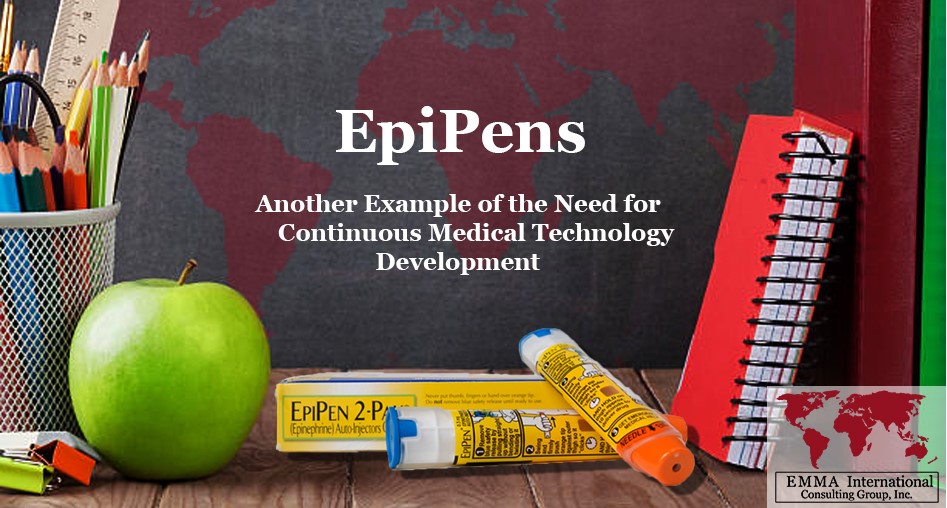EpiPen Shortage
Kids are going back to school all over the country. For many kids, an EpiPen (epinephrine injection) is a necessary addition to their back to school list. Food allergies are an increasing public health concern that affects an estimated 4-6% of children in the United States. In recent years, EpiPens have provided a welcomed sense of security for many parents sending their children to school. EpiPen and EpiPen Jr. are devices made to deliver the lifesaving drug [epinephrine] during emergency treatment of serious allergic reactions, including anaphylaxis. In 2013, in an effort to improve public health and public policy, President Obama signed the School Access to Emergency Epinephrine Act, which provides financial incentives to schools that keep epinephrine auto-injectors on hand. However, due to a recent shortage that began last May and has continued into the Fall, many parents are worrying that they will start the school year off without this life saving medication.
EpiPen was first approved by the Food and Drug Administration (FDA) in 1987. EpiPen is the brand name of a device that delivers the drug [epinephrine], which is a life-saving medication used when someone is experiencing a severe allergic reaction, known as anaphylaxis. The EpiPen is an auto-injectable device, that when administered, the medication works to shut down the allergic response. Epinephrine auto-injector products are known as “combination products” because they consist of a drug (epinephrine) and a device (the auto-injector).
The recent shortage of EpiPens can be traced back to several FDA inspection violations including the September 2017 warning letter to Meridian Medical Technologies’ facility, which manufactures Mylan’s EpiPen (epinephrine injection). EpiPens are sold by Mylan and manufactured at a Pfizer owned plant in Brentwood, Mo. The company has since been unable to make enough EpiPens because it is changing its manufacturing processes in response to the FDA cited violations, including a failure to investigate serious complaints about product quality. In a statement, Pfizer said, “We are working tirelessly to increase production and expedite shipments as rapidly as possible.” This started the catalyst for the recent back to school shortage.
Need for Continuous Innovation in Medical Technologies
The EpiPen serves as an excellent example for the need for continuous medical technology advancements. Snap Medical provides an alternative to the EpiPen with their Epinephrine Snap line. Nancy Creadon, President of Snap Medical Industries, responded to the recent shortage of EpiPens:
“That’s why we developed our Epinephrine Snap line–so that nurses (whether in school, hospitals or anywhere) or other trained clinicians could draw up and inject possibly life-saving epinephrine without using an auto-injector, thus saving it for a patient who truly needs to self-administer. That’s the niche we are privileged to fill: providing “a better way to treat anaphylaxis.”
What is FDA Doing to Help
In August of this year, FDA Approved Teva Pharmaceutical Industries Ltd.’s generic version of Mylan’s EpiPen injector.
Additionally, to address this public health concern, FDA has extended expiration dates on some batches of the EpiPen, which typically expire after 20 months. In a statement by FDA:
“Many patients rely on self-injectable epinephrine products, such as EpiPen, to reverse life-threatening reactions to bee stings or other allergens for either themselves or for their children. We are doing everything we can to help mitigate shortages of these products, especially ahead of the back-to-school season. We’ve completed the necessary reviews of the data to extend the expiration date by four months for specific lots of EpiPen that are expired or close to expiring. We’re hopeful this action will ensure patients have access to this important medication and provide additional peace-of-mind to parents as the agency works with the manufacturer to increase supply,” said Janet Woodcock, M.D., director of the FDA’s Center for Drug Evaluation and Research. “The FDA remains committed to using all of the tools available to help prevent and mitigate drug shortages of medically necessary products used to prevent or treat a serious or life-threatening disease or medical condition.”
There are other options such as Amneal Pharmaceuticals’ Adrenaclick, which is an epinephrine auto-injector, whereas the private drug maker Kaleo makes the Auvi-Q, a smaller, rectangle-shaped device that talks the user through how to use it. However, insurance challenges are a significant barrier with this alternative.





